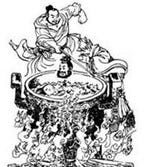Chinese Sword Culture and Traditional Folklore “Gan Jiang Mo Ye”(干将莫邪)
During the Spring and Autumn periods, the regions of Wu and Yue were renowned for their sword-making techniques. Gan Jiang (干将) and Mo Ye (莫邪) (husband and wife, sometimes also referred to as master and apprentice) were the most exceptional swordsmiths of their time. According to Gan Bao’s Records of the Supernatural from the Eastern Jin Dynasty, the King of Wu ordered Gan Jiang to forge peerless swords.
They gathered the finest iron from five mountains and the purest metal from six directions, building a furnace at Mount Wu (modern-day Suzhou). With the help of three hundred young boys and girls, who pumped the bellows and tended the flames with unwavering dedication, they spent three long years in the forge, their days and nights blurred by the glow of the furnace. They sacrificed everything to infuse the swords with a soul, a spirit that would make them more than mere weapons. When the forge cooled, they emerged with a pair of swords, one named "Gan Jiang" (the male) and the other "Mo Ye" (the female), twin flames that resonated with an eternal bond.
Their art was not merely a craft but a devotion, a dance of fire and metal that breathed life into blades of extraordinary power and beauty. But Gan Jiang, ever the cunning artisan, knew the king’s heart was fickle and cruel. He decided to keep the male sword hidden, presenting only the female blade to the king. As he journeyed to the palace, a heavy foreboding weighed on his heart. "If you bear a son," he whispered to Mo Ye, "tell him to look to the southern mountain, where pines grow from stone. There, behind the trees, the male sword awaits." True to his fears, the king, enraged by the delay, executed Gan Jiang without mercy.
As the child of Mo Ye and Gan Jiang grows up, he often questions where his father is. Years passed, and their son Chi grew into manhood. The mother finally tells their Chi that his father was killed by the emperor, leaving Chi’s heart burning with the fire of vengeance. Guided by his mother’s words, he found the hidden sword and vowed to avenge his father. But the king, too, had dreams- visions of a youth with a broad forehead, eyes blazing with wrath. Panicked, the king offered thousands of golds for Chi’s search warrant. Cornered and desperate, Chi fled into the wilderness.
While fleeing into the mountains, Chi met a swashbuckler in black who said, "I can kill the king, but I need your head and sword." "Take my head and my sword," Chi pleaded in response, "and use them to strike down the king. Let my death be the spark that ignites justice." Moved by the boy’s resolve, the swashbuckler agrees. Chi immediately beheaded himself, offering his head and sword with both hands. The swashbuckler presented the head to the king, who ordered it boiled in a bronze cauldron. The king, trusting the swashbuckler’s words, ordered a massive cauldron to be prepared. For three days and three nights, the flames roared, yet Chi’s head remained unbroken, his eyes wide with undying fury. It leaped from the boiling water, defiance etched into every feature. The swashbuckler, seizing the moment, urged the king closer. "See for yourself," he whispered. As the king leaned in, the swashbuckler struck—driving the sword through the king’s heart—and then turned the blade upon himself, joining Chi in death.
The three heads—Chi’s, the king’s, and the swashbuckler’s—twisted and laughed in the cauldron, their final defiance echoing through the air. When the ashes settled, the people buried them with honor, naming the graves "The Three Kings’ Mounds." And so, the legacy of Gan Jiang and Mo Ye lived on, a tale of love, sacrifice, and the unbreakable bond between a father, a mother, and a son who would stop at nothing to right a wrong.
The story of Gan Jiang, Mo Ye, and Chi is not just a myth but a mirror reflecting universal human experiences- struggles for justice, the weight of legacy, and the quest for meaning in the face of adversity. The king’s demand for the sword and subsequent actions reflects power abuse. This serves as a cautionary tale about authority figures and the potential for tyranny when power is unchecked. It prompts critical thinking about leadership, accountability, and the importance of challenging unjust systems. By contrast, Chi’s defiance against the king symbolizes resistance against oppression. This theme is timeless, resonating with movements throughout history where individuals have stood up against injustice, even at great personal cost. It highlights the courage required to challenge authority and fight for what is right.
This legend, transcending time, symbolizes the eternal clash between tyranny and resistance and the transcendent power of human will.






